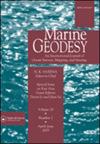Shore Zone Classification from ICESat-2 Data over Saint Lawrence Island
IF 1.4
4区 地球科学
Q2 GEOCHEMISTRY & GEOPHYSICS
引用次数: 3
Abstract
Abstract The shore zone is the most active zone in the atmosphere, hydrosphere, biosphere and lithosphere of nature, and has the environmental characteristics of both ocean and land. The ICESat-2 satellite provides height measurements of shore zone using a photon-counting LiDAR. The purpose of this study is to explore the application potential of ICESat-2 satellite data in shore zone classification. Saint Lawrence Island, Alaska, was chosen as the study area. Firstly, in this study, the upper and lower boundaries of the shore zone of the study area were extracted based on Google Earth images. The slope and width between the two boundaries were then calculated according to the formula. Secondly, six statistical indicators (standard deviation, relative standard deviation, average absolute deviation, relative average deviation, absolute median error and quartile deviation) related to the substrate and sediment classification that could reflect the characteristics of the shore zone profile were extracted, and the statistical indicators were used as input parameters of the softmax regression model for classification. Finally, the accuracy of the shore zone classification was validated using the ShoreZone classification system. The results show that, among the 246 shore zone sections in the study area, 86% (212) has been correctly classified. The results therefore indicate that ICESat-2 data can be used to support the characterization of shore zone morphology.基于圣劳伦斯岛ICESat-2数据的海岸带分类
海岸带是自然界大气、水圈、生物圈和岩石圈中最活跃的区域,具有海洋和陆地的双重环境特征。ICESat-2卫星使用光子计数激光雷达提供海岸区域的高度测量。本研究旨在探讨ICESat-2卫星数据在海岸带分类中的应用潜力。阿拉斯加的圣劳伦斯岛被选为研究区域。首先,本研究基于谷歌地球影像提取研究区海岸带上下边界。然后根据公式计算两个边界之间的斜率和宽度。其次,提取出能反映岸带剖面特征的6个与底泥分类相关的统计指标(标准差、相对标准差、平均绝对偏差、相对平均偏差、绝对中位数误差和四分位数偏差),并将这些统计指标作为softmax回归模型的输入参数进行分类。最后,利用ShoreZone分类系统验证了岸带分类的准确性。结果表明,在研究区246个岸带剖面中,有86%(212个)的岸带剖面被正确划分。结果表明,ICESat-2数据可用于支持海岸带形态的表征。
本文章由计算机程序翻译,如有差异,请以英文原文为准。
求助全文
约1分钟内获得全文
求助全文
来源期刊

Marine Geodesy
地学-地球化学与地球物理
CiteScore
4.10
自引率
6.20%
发文量
27
审稿时长
>12 weeks
期刊介绍:
The aim of Marine Geodesy is to stimulate progress in ocean surveys, mapping, and remote sensing by promoting problem-oriented research in the marine and coastal environment.
The journal will consider articles on the following topics:
topography and mapping;
satellite altimetry;
bathymetry;
positioning;
precise navigation;
boundary demarcation and determination;
tsunamis;
plate/tectonics;
geoid determination;
hydrographic and oceanographic observations;
acoustics and space instrumentation;
ground truth;
system calibration and validation;
geographic information systems.
 求助内容:
求助内容: 应助结果提醒方式:
应助结果提醒方式:


